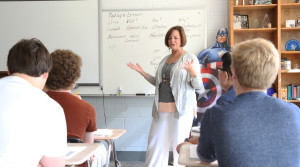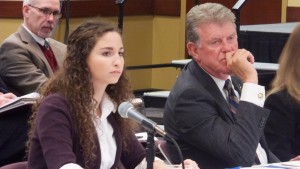The 20 reform recommendations from Gov. Butch Otter’s Task Force for Improving Education are making a difference in the classroom, a Capital High School teacher said Wednesday.

Social studies and American government teacher Cindy Wilson, now a member of the Idaho Board of Correction, said she was originally conflicted about her task force appointment.
“I was ready to move off the task force,” Wilson said. “I didn’t want to be a part of a program that is just to be seen, and not taken seriously. We spend a lot of time talking about important issues in the state of Idaho, and this cannot just be (a show) for the TV cameras.”
But Wilson was glad she stuck it out, saying the recommendations will help students prepare for life after high school.
“What we see now is an emphasis on getting students college-ready or trade-ready,” Wilson said.
She pointed to the expansion of advanced opportunities, dual credit and concurrent courses that the task force endorsed and the Legislature has funded over the past two sessions. In the end, she says the recommendations will help the state approach its goal of having 60 percent of young adults hold some type of college degree or professional-technical certificate by 2020.
“(My students) have experience in rigorous courses,” she said, adding that many students in the Boise and West Ada school districts are now earning an associate’s degree by the time they graduate high school.
“One of the biggest concerns they have is paying for college,” Wilson continued. “Well, if they graduate with half of their college complete, thanks to the state, then there are more opportunities to finish school.”
Wednesday’s 75-minute meeting at Boise State University served as a status update on the implementation of task force recommendations and a rallying cry to continue to phase-in during the 2016 legislative session.
Otter also expanded the task force’s lineup, inviting Boise High School senior Simone Migliori to the table. Simone caught Otter’s attention when she published a September opinion piece encouraging decision-makers to listen to the voices of Idaho students. Simon also highlighted the student-led nonprofit One Stone in her op-ed piece and has participated in the 24-hour Think Challenge, where Idaho students came together over two days to brainstorm ideas for improving the education system.

On Wednesday, Simone asked for a status update on the task force’s recommendation involving college and career counseling. Afterwards, she praised task force members for bringing teachers such as Wilson to the table, and said she enjoyed the experience and hopes to make a difference.
Task force members describe the recommendations as a five-year plan, and said they still have much to accomplish. The Legislature funded the first year of the career ladder teacher salary program in 2015, but they still need to ramp up funding over the next four years. Work is just beginning — through a small pilot program and awareness campaign — on addressing the recommendation to shift to a mastery-based system of education. The task force’s recommendation to revamp school funding and move to an enrollment-based finance model also awaits implementation.
For upcoming legislative session, House Education Committee Chairman Reed DeMordaunt, R-Eagle, said he has a couple of priorities in mind. He wants to ensure the state’s teacher evaluation system is fair, consistent and performed with integrity. He also wants to secure funding for a second year of the career ladder.
“Today was more or less just a reaffirmation that the path we are on is right path,” DeMordaunt said after the meeting. “And I, personally, need to get some more specific feedback on some of these recommendations.”
